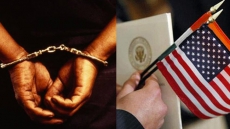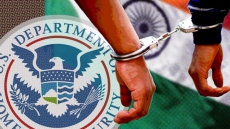The Islamic State on Tuesday claimed responsibility for the suicide bombings targeting churches and luxury hotels in Sri Lanka as the death toll in the Easter Sunday bloodbath touched 321, including 10 Indians, with over 500 injured.
The Islamic State's claim came as the country held a mass funeral for some of the victims at a sprawling grave near the St Sebastian's Church in Negombo, around 40 km north of Colombo, where mourners struggled to hold back their tears.
An Arabic language statement on the group's official al-Amaq news agency made the claim on the encrypted messaging app, saying the suicide bombers were "fighters of the Islamic State".
1. The Islamic State’s news agency has claimed responsibility for the string of bombings in Sri Lanka which left 321 people dead. It’s taken them more than 2 days to do so, which is unusually long for ISIS: pic.twitter.com/DolnkeSAkc
— Rukmini Callimachi (@rcallimachi) April 23, 2019
"The perpetrators of the attack that targeted nationals of the crusader alliance (anti-IS US-led coalition) and Christians in Sri Lanka were Islamic State fighters," the brief message said.
Tuesday's statement came after an unconfirmed video posted to social media by an affiliated group suggested that the Islamic State was behind the Easter horror. That video showed photos of three of the alleged suicide bombers.
The Sri Lanka Easter bombings were carried out by a “radical Islam group” in retaliation for the Christchurch mosque attacks, defense minister says.@IvanCNN, live from Negombo, Sri Lanka with the latest.
— CNN (@CNN) April 23, 2019
Follow more live updates: https://t.co/aUlRNn6ULJ pic.twitter.com/RnU587Qv5t
The men, who are described as "assailants" rather than the more common "martyrs", were named as Abul Barra, Abul Mukhtar and Abu Ubaida and featured in front of a black IS flag giving the one-finger salute, the news.com of Australia said.
"The walls were full of blood spread everywhere, the whole church was blood." A 16-year-old girl describes the aftermath of the Sri Lanka bombings. pic.twitter.com/vfb0eNrEj2
— AJ+ (@ajplus) April 22, 2019
Authorities have so far named a Sri Lankan Muslim group, the National Thowheed Jamath (NJT), for the bombings but said the mayhem would not have been possible minus international support.
Earlier in the day, Defence Minister Ruwan Wijewardene said the Easter attacks were a "retaliation" for last month's Christchurch mosque shooting that left 50 Muslims dead and were blamed on a white supermacist from Australia.
The Minister put the latest death toll in Sri Lanka at 321.
The Islamic State's and the Defence Minister's claim give an international dimension to the Sunday carnage that killed mostly Sri Lankans but also some 35 foreigners, including from the US and other Western countries as well as 10 Indians.
"I’ve lost my whole family. My two children, they’ve still not been found."
— Al Jazeera English (@AJEnglish) April 23, 2019
Funerals begin for some of the victims of the Easter Sunday bombings in Sri Lanka. pic.twitter.com/W9fYMu4V0y
The Indian High Commission said that with the death of two more Indians, the Indian death toll had risen to 10.
Also on Tuesday, Sri Lanka observed a day of national mourning, with the national flags on public buildings flying at half mast.
#SriLanka bombings: funerals and burials begin @AJEnglish https://t.co/NgiBazXCJI pic.twitter.com/pU9Wz2jWmA
— showkat shafi (@ShowkatShafi) April 23, 2019
The mourning started at 8.45 a.m. to coincide with the start of the deadly attacks on Easter worshipers at churches and guests at hotels in three Sri Lankan cities.
Three minutes of silence were observed across Sri Lanka to honour the dead.
The police have detained 40 suspects in connection with the attacks. Reports said they include a Syrian who was caught after the interrogation of local suspects.
ISIS claims responsibility for Sri Lanka bombings https://t.co/tfwdweprCU pic.twitter.com/2wxSnf9zFI
— New York Post (@nypost) April 23, 2019
The government has suggested that seven suicide bombers were involved in the bombings.
A CCTV video showed one of them, a young man wearing a sky blue shirt and jeans and carrying a backpack, casually walking into an Easter congregation in a church where he blew himself up.
The series of attacks on Sunday began with six nearly simultaneous explosions targeting three luxury hotels in Colombo and three churches - one in Colombo, another in Negombo and the third in the Tamil-majority Batticaloa town in the island's east.
Hours later, a seventh blast took place in a small hotel near the Colombo zoo killing two persons.
The last of the bombings occurred when police raided a residential complex in Dematagoda, a neighbourhood in Colombo, but a terrorist detonated himself killing three policemen and also the wife and sister of one of the suicide bombers.
Sunday was the deadliest day in the country since the end of a civil war between Tamil Tigers and government forces that began in 1983 and ended in 2009.
The first mass burial for the victims of the Easter Sunday bombings took place in Colombo on Tuesday.
— TicToc by Bloomberg (@tictoc) April 23, 2019
Sri Lanka's Minister of Defense says at least 321 people were killed in the attacks pic.twitter.com/MneTyqFPlO
Meanwhile, police in Colombo issued an alert that a van or truck carrying explosives may be in Colombo following which security was stepped up at government buildings and police stations.
'NO ANSWERS:' CANADIANS REACT TO SRI LANKA BOMBINGS THAT KILLED HUNDREDS
TORONTO — A spokesman for an organization representing Sri Lankan-Canadians says he has "no answers" in the wake of co-ordinated bomb attacks in his homeland that killed at least 207 people and injured 450 more.
Riyaz Rauf, vice-president of the Canada Sri Lankan Association of Toronto, says he found out about the bombings via text messages from friends just after midnight.
When he turned on the TV to watch the news, he says he was appalled by the "horrendous" images he saw. In a phone interview with The Canadian Press on Sunday morning, Rauf described the attacks as a "loss of humanity."
Absolutely horrific news from Sri Lanka. Canada strongly condemns the heinous attacks on Christians at churches and hotels. Our hearts & thoughts are with the families & loved ones of those killed and all those injured.
— Justin Trudeau (@JustinTrudeau) April 21, 2019
The federal government warned Canadians in Sri Lanka to limit their movements and obey local authorities, saying the situation in the country remains "volatile" and more attacks are possible. It added that the High Commission of Canada to Sri Lanka in the capital Colombo would be closed on Monday due to the security situation.
Global Affairs Canada said in an email Sunday afternoon that there are no reports of any Canadian citizens being affected by the blasts, whose targets included hotels and a church frequented by tourists.
Sri Lanka's Foreign Ministry said the bodies of at least 27 foreigners were recovered, and the dead included people from Britain, the U.S., India, Portugal and Turkey. China's Communist Party newspaper said two Chinese were killed.
Prime Minister Justin Trudeau joined other world leaders in expressing sorrow and shock at the attacks, while condemning the targeting of worshippers on Easter Sunday.
"Canada strongly condemns these heinous attacks on hotels and Christians at prayer in churches. Places of worship are sacred, where all should feel safe and secure. No one should be targeted because of their faith," the prime minister said in a statement.
"For millions of people around the world, Easter is a time to reflect on Jesus' message of compassion and kindness — a time to come together with friends and family. We cannot let attacks like these weaken the hope we share."
Sri Lanka's defence minister described the bombings as a terrorist attack by religious extremists and police said 13 suspects had been arrested, though there was no immediate claim of responsibility. Most of the blasts were believed to have been suicide attacks.
Prime Minister Ranil Wickremesinghe said he feared the violence could trigger instability in Sri Lanka, a country of about 21 million people, and he vowed the government will "vest all necessary powers with the defence forces" to take action against those responsible. The government imposed a nationwide curfew from 6 p.m. to 6 a.m.
The eight explosions represent the deadliest violence in the South Asian island country since a bloody civil war ended a decade ago.
Rauf, who moved to Canada nine years ago, said he's at a loss to explain the reasons behind the violence — but he's confident his homeland will persevere.
"There's absolutely no reason — no cause, nothing — for something like this to be happening in this beautiful country," he said.
However, Rauf added: "Sri Lanka as a nation has come through the worst period that it could ever come out of. We had a civil war for 25 years. We are a bunch of resilient people who can overcome adversity."
Amarnath Amarasingam, a postdoctoral fellow at the University of Waterloo who has authored several books and papers on Sri Lanka, said even in a country "brimming" with ethnic and religious conflict, no one expected an attack of this scale.
"It's just multiple kind of layers of complexity in terms of ethnic and religious relations, which this attack kind of really throws up in the air," Amarasingam said in an interview Sunday. "Things could get ugly pretty fast from here, I think, if we're not careful."
Sri Lanka was dominated for decades by the sharp divide between the majority Sinhalese, who are overwhelmingly Buddhist, and the minority Tamil, who are Hindu, Muslim and Christian. The mistreatment of Tamils helped nurture the growth of armed separatists and led to nearly 30 years of civil war, with Tamil Tiger fighters eventually creating a de facto independent homeland in the country's north until the group was crushed in a 2009 government offensive.
More recently, Muslims, who make up roughly 10 per cent of the country's population, have been targeted by violence fuelled by rumours spread over social media about attacks on Buddhists. In 2018, mobs of Buddhists swept through small towns, attacking mosques and Muslim-owned shops, prompting the government to briefly declare a state of emergency.
Amarasingam said those tensions have lingered to some extent in Canada, which is home to roughly 150,000 people of Sri Lankan or mixed Sri Lankan descent, according to 2016 figures from Statistics Canada.
A significant portion of that population are Muslims, he said, and he imagines many are concerned the attacks could lead to a flare up in anti-Muslim sentiment or even violence.
Despite that, Rauf — who is Muslim — said he believes the community will also come together to support each other in this time of tragedy.
"One thing good about the Sri Lankan community that has migrated to Canada is that when they migrated from Sri Lanka, few people brought their baggages, their way of thinking from back home," said Rauf.
"The new generations — the second generation and the third generation that have got used to living here — adopted the Canadian culture, understood the ethnic harmony here. They're all united," he said.
"For us, religion comes second — it's humanity first, the person who is first."


